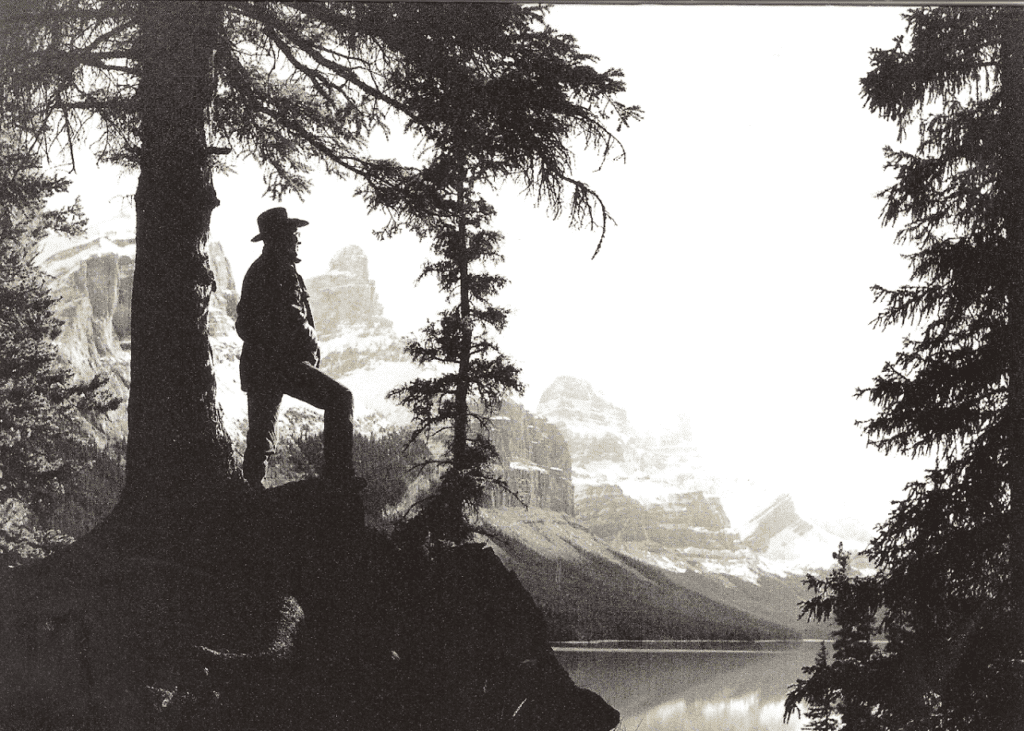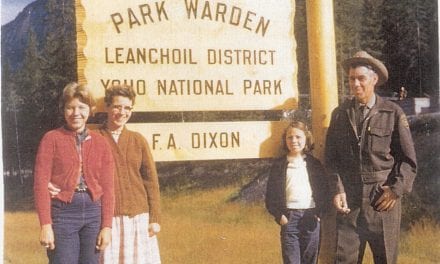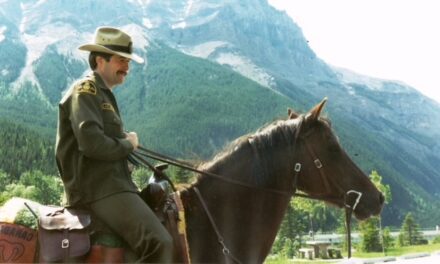(Part Two – 0:00:13) When I was still a warden at Maligne years ago, this would be in the 1960s, Bruno (Engler, a mountain photographer) wanted to go to the viewpoint to where they take the pictures, the famous pictures. It is ten or eleven miles down the lake so I said, “Well, I’ll take you down.” We got down there and we were parked on the shoreline and we went up to the viewpoint where he took this picture (showing a photo that has since been made into a card). A big bull moose came along and he was walking the shoreline because there weren’t any docks. We had taken the docks out. This bull moose was trying to figure out how to get around this boat on the shoreline. We were watching him from 100 feet away and Bruno said, “You know he is going to get in your boat. You should have tied that boat up better. He is going to try and drive it away!” You know his sense of humor! It was late in October and the bull mouse was in full rut.

Mac Elder at Maligne Lake 1965/66. Photo by Bruno Engler
(0:06:17) Oh, a lot. (In response to the question, “What was the difference between the Palisades school in Jasper and Cuthead College in Banff?”) Cuthead College was strictly mountain rescue. This (the Palisades) was more technical…The first (warden) school we had was in the bottom of the Masonic Hall in Banff. That one we did fire suppression and public relations. The next one moved to Jasper and we were at Jasper seven or eight times…I give Steve Kun, Tommy Ross and Mickey McGuire and some of those guys credit for that. They looked at guys like Wally McPhee and myself and a lot of people from that era and some of them told us this, “We are not going to hire guys off the street anymore. We are going to hire people out of the technical schools and out of the natural science schools. But you guys who have been in the field are going to have to train them and work with them and supervise them in the next 20 years.” This is what they said. A lot of these guys, not all of them, but half of them were handpicked to become chief wardens and managers. You see there is quite a cross section when you look at the parks…This was before we went to the area concept. We were still in the district concept.
(0:08:55) There wasn’t anything wrong with the area concept…Jasper had 14 districts I think. In 1969 they went from 14 districts to five area management units. There wasn’t too much wrong with the area concept. I was at Maligne Lake at that time and they brought in, the Rocky River. On the north boundary they pulled Blue Creek and Willow Creek…and put four (districts) into one (area). Anyway they ended up with five area management units. Then in about a year they revised it again and went from five units to four. That’s when they moved me to town because my district at Maligne and Rocky River was absorbed into the town area. I took over that high use area and I had Maligne, the Rocky, Pocahontas and the main valley and the town site all that stuff into one area. The north boundary became one area. Olle was looking after the north boundary. Toni Klettl took in Marmot Basin the ski area and the Tonquin Valley…The forth area was the south area, Athabasca Falls and the Ice Fields.
(0:11:04) I was called an area manager. I think I had about eight (permanent wardens) and a lot of seasonals (working in the area). The position that I filled when we went to that concept was a PRC10 with a five supervisory. The rest of them were PRC10 with a three supervisory. I don’t think the area manger concept was a bad concept, it seemed to work. What we had was four assistant Chief Wardens. I don’t think that was a bad idea. Lake Louise and Banff did something like that too…I don’t think that there was a lot of resistance to the area concept, but there might have been. I didn’t know about it too much. It (the area concept) was still in effect when I moved east….but you see again…my opinion today is because I was at Maligne and all of that that happened there and that highway and that development…because of that experience (it) was like a new park, I think that’s why I went to Pukaskwa and the reason I went to Pacific Rim is because of the experience I had at Pukaskwa and Maligne. Those were different jobs. We were builders…I don’t know where you would find somebody today to go to a place like Pukaskwa where you’re the general works man, you look after the capital program and you are a chief warden and you are a jack-of-all-trades. That is the kind of thing that Mickey McGuire and Bob Hand and those fellows did 60/70 years ago. I don’t know where they could find anybody that could do all that now. We couldn’t push paper, we didn’t know how to manage an office, but we knew how to get work done in the field. We didn’t grow up in an office with a computer.
(0:14:16) When they brought a computer into Pacific Rim that was about two and a half years before I retired. Tommy Heggie was the Superintendent then. He is old school and a good guy. He was one of those common sense guys. He said, “What do you think about this computer business?” I said, “Well, it’s necessary, it is going to come. But I am only two years away from retirement and I think that I have a work load that I can hardly keep up to now. I don’t think it is worth your time to take me out of the job and put me in some training (program) to run a computer and do this kind of stuff that’s going to come ahead of me. I think that you would be a lot better off to hire a clerk at half of my wages and let them do that job and work with me and leave me doing stuff that I am good at.” He said, “Well, I feel the same way. I exactly agree with you, that’s why I asked you.” He said, “I’m not going to do it either because I’ve got all I can do now and if I have to go and be trained to do all this work on the computer, something else is going to go astray.” I did learn to be able to go and put a password into the computer…then I could go down to another room and get my stuff that was sent out of region. I didn’t send anything back. I used to take this stuff…and scribble out a little note and give it to one of the ladies and they would reply and it worked. You can’t train an old dog! Like that malamute I had, too many bad habits! I couldn’t get it to quit chasing elk!
(0:16:38) Not anymore no. (In response to the question, “Do you ever miss being a warden?) I wouldn’t want to be (a warden today). I wouldn’t want to be in this modern mess that they are in. Did you ever see so many unhappy wardens and unhappy people in the parks service as there are today? I don’t want to be in that mess. When I was there most of us enjoyed what we were doing, but most of those guys today are just putting in time. Everyone I talk to can’t wait to get out and that’s wrong! It isn’t fun anymore and there isn’t any pride. It is like one of those good wardens told me at that 100th anniversary, he said, “That outfit in Ottawa has torn the heart right out of the warden service.” Ripped the heart right out of us. That is a sad thing to say.
(0:17:50) Well the district system was the start of it (In response to the question, “What was it about the warden service that made it so special?”)…I’ll say this, the people who came in to be wardens there were many different types and many different personalities. The wardens that came…they thought different and they were not cut out with a cookie cutter, but after they had been around eight or ten years, they had a whole lot in common. They all could work together and they were individuals, but at the same time when you went to do something, and some of the crisis stuff we did like; look for lost people, fight fire, deal with problem wildlife, deal with a drowning, deal with any of that stuff or an mountain accident, you could go and pull in four or five wardens and do the job. They could all help, they could all do it. Now everyone wasn’t skilled 100% in every faculty, but as a group they could do it, because somebody knew how to do a little bit of everything. I always believe the generalists were pretty good to deal with, more so than specialists. Specialization came in, in my time and in your dad’s time and I am not totally sure that I agreed with the specialist thing. But I certainly believe there is a lot of room there for generalist yet, because you don’t have that volume of people that everyone can be a specialist. We went through that specialist thing and a lot of people thought it was great. I didn’t and I don’t want to be a specialist. I would rather be a generalist and if I was going on an emergency tomorrow I’d rather have a generalist with me. People that have specialized skills, like you certainly need specialized skills in law enforcement and wildlife management…but you shouldn’t forget about all the other things. The early day park warden did not take the job for the money or for the big pay, but for the lifestyle. The park warden job was a way of life.



